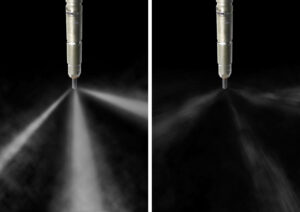Long functional safety through professional maintenance
The highly developed injection technology also requires regular maintenance in order to prevent premature system failures.
Today’s common rail injection nozzles can carry out several injection processes during a single combustion cycle. The fuel is injected into the combustion chamber at pressures of up to 2,000 bar through the openings of the injection nozzles, which are only 1 micrometer in size. On the one hand, this results in considerable advantages, such as lower fuel consumption, lower emissions and better driving behavior. On the other hand, this also means a much higher susceptibility to wear and tear and thus a malfunction or even failure of the entire system.
What are the reasons for the common rail injectors to fail?
Injection nozzles are fundamentally designed for durability. But advances in injection technology mean that they are also more prone to wear and tear.

Injector Left: efficient spray pattern Right: poor spray pattern due to clogged spray head
Nozzle openings, with tolerances of a fraction of the width of a human hair, can become clogged with dirt particles and thus cause considerable damage. Corroded metal surfaces, caused by water in the fuel, can narrow the openings of the injection nozzles and, in the worst case, even close them completely. Soot deposits, also known as coking, can also adhere to the needles in the injection nozzles and thus negatively affect the injection quantity, the injection pattern and the injection time.
What are the signs of defective common rail injectors?
The most common cause of a malfunctioning injection process into the combustion chamber is a worn or even defective injection nozzle. This is often recognized by:
- a rough idle
- Engine knocking
- Engine misfiring
- excessive fuel consumption
- increased emissions
Proper maintenance can often prevent these problems and avoid costly repairs.
The situation is different in the case of mechanical complications or failures, which are often noticed by the engine control lamp lighting up, fuel leaks from the injection nozzles or uncontrollable power surges. In most cases, the only thing that helps here is replacing the affected parts.
Tip: Mechanical failures can also be prevented by professional maintenance!
We recommend adding our common rail diesel system cleaner to the diesel fuel immediately before refueling. The effect has been confirmed to us several times by TÜV Thuringia (PRO-TEC and bluechem), with which we can offer a professionally independently tested solution against wear on common rail engines for any aggregate.
Our unbeatable duo for winter:
Common Rail Diesel System Cleaner and Diesel Anti Freeze
The big disadvantage of the economical diesel engine compared to gasoline engines
The economical diesel reaches its physical limits, especially at low temperatures. The paraffin contained in diesel solidifies and causes all of the fuel to gelling. The risk increases that the crystallized diesel can no longer be pumped. Lines, filters and the fuel pump can clog, which in the worst case scenario prevents the diesel from reaching the engine. The engine is about to strike!

Broken down vehicle due to clogged diesel lines and filters.
Normally, the regionally available winter diesel (if available) prevents freezing through additives in the fuel. However, if this is not available, or if the vehicle or unit is shut down over the winter, our diesel frost protection helps, which guarantees winter safety of down to -33 ° C. Simply put this in the fuel tank before refueling.
Caution: Paraffin that has already crystallized / gelled can only be melted again by heating to around 40 ° C!
If you have any questions or suggestions, please contact our service team. We are happy to help you!
Mail: info@bluechemgroup.com
“bluechemGROUP in harmony with vehicles and the environment.”
Author:
Michael Gänslein
Sales Manager for central and southern Germany
